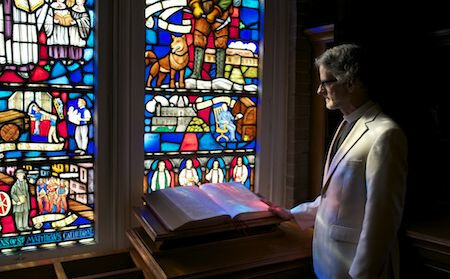Arrival

First I’ll clear my throat. This new film has flaws, perhaps especially in the use of shallow stereotypes for minor characters. Nonetheless, it is magnificent and wondrous. This theologian believes it is worth wide viewing, followed by pondering and thanks to God for a changing cultural moment.
The “arrival” of the title occurs when twelve alien objects land, or hover, at twelve places on Earth. To the one in Minnesota goes a linguist who gets to communicate with them. She discovers that their language is non-temporal: it is written in circles where the beginning and the end of the thought are simultaneously present.
And so we have, in a film without explicit theological referent, an exploration of what it means to see time all at once, which is (I think) the same as the question of how does God (who is not subject to time) see his creatures (who are). The film doesn’t do the nonsensical: it doesn’t suppose that it is possible to travel backwards in time. But it does set before us the possibility of seeing time all as a whole.
I recently was asked by a young person who is considering marriage, whether I would do it all over again, if I knew at the beginning that my wife would get brain cancer and ultimately die. It was a great question, and posed with existential interest. “Of course I would!” blurted forth from my mouth.
When we see life as a whole, which is to say when we see the beginning and the end all together, we can see the gift that it is, and give thanks for it all. The evils of this existence are wrapped up and surrounded by the luminous mystery of the one who died and then rose.
In addition, this theological ethicist wants to celebrate a small point in the film “Arrival.” Although there is no sex scene in the film, there is some sexual tension. And at one point, as a couple is embracing, the question is whispered: “Do you want to make a baby?” For too long our culture has encouraged an understanding of sex that is divorced from having children. Kudos to the makers of “Arrival” for showing the sexiness (and the wonder) of bringing sex and procreation together.
---
Out & about. I will be teaching a four-week class on “The Song of Songs” on the Sundays in Advent, beginning November 27. The sessions are at 10:15 a.m. at Incarnation, 3966 McKinney, Dallas.

